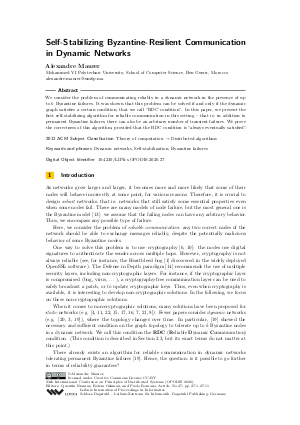Self-Stabilizing Byzantine-Resilient Communication in Dynamic Networks
Author Alexandre Maurer
-
Part of:
Volume:
24th International Conference on Principles of Distributed Systems (OPODIS 2020)
Part of: Series: Leibniz International Proceedings in Informatics (LIPIcs)
Part of: Conference: International Conference on Principles of Distributed Systems (OPODIS) - License:
 Creative Commons Attribution 3.0 Unported license
Creative Commons Attribution 3.0 Unported license
- Publication Date: 2021-01-25
File

PDF
LIPIcs.OPODIS.2020.27.pdf
- Filesize: 437 kB
- 11 pages
Document Identifiers
Subject Classification
ACM Subject Classification
- Theory of computation → Distributed algorithms
Keywords
- Dynamic networks
- Self-stabilization
- Byzantine failures
Metrics
- Access Statistics
-
Total Accesses (updated on a weekly basis)
0Document
0Metadata
Abstract
We consider the problem of communicating reliably in a dynamic network in the presence of up to k Byzantine failures. It was shown that this problem can be solved if and only if the dynamic graph satisfies a certain condition, that we call "RDC condition". In this paper, we present the first self-stabilizing algorithm for reliable communication in this setting - that is: in addition to permanent Byzantine failures, there can also be an arbitrary number of transient failures. We prove the correctness of this algorithm, provided that the RDC condition is "always eventually satisfied".
Cite As Get BibTex
Alexandre Maurer. Self-Stabilizing Byzantine-Resilient Communication in Dynamic Networks. In 24th International Conference on Principles of Distributed Systems (OPODIS 2020). Leibniz International Proceedings in Informatics (LIPIcs), Volume 184, pp. 27:1-27:11, Schloss Dagstuhl – Leibniz-Zentrum für Informatik (2021)
https://doi.org/10.4230/LIPIcs.OPODIS.2020.27
BibTex
@InProceedings{maurer:LIPIcs.OPODIS.2020.27,
author = {Maurer, Alexandre},
title = {{Self-Stabilizing Byzantine-Resilient Communication in Dynamic Networks}},
booktitle = {24th International Conference on Principles of Distributed Systems (OPODIS 2020)},
pages = {27:1--27:11},
series = {Leibniz International Proceedings in Informatics (LIPIcs)},
ISBN = {978-3-95977-176-4},
ISSN = {1868-8969},
year = {2021},
volume = {184},
editor = {Bramas, Quentin and Oshman, Rotem and Romano, Paolo},
publisher = {Schloss Dagstuhl -- Leibniz-Zentrum f{\"u}r Informatik},
address = {Dagstuhl, Germany},
URL = {https://drops.dagstuhl.de/entities/document/10.4230/LIPIcs.OPODIS.2020.27},
URN = {urn:nbn:de:0030-drops-135126},
doi = {10.4230/LIPIcs.OPODIS.2020.27},
annote = {Keywords: Dynamic networks, Self-stabilization, Byzantine failures}
}
Author Details
References
-
The Heartbleed Bug (http://heartbleed.com).

- Anish Arora and Sandeep S. Kulkarni. Component based design of multitolerant systems. IEEE Trans. Software Eng., 24(1):63-78, 1998. URL: https://doi.org/10.1109/32.663998.
-
B. Awerbuch, R. Curtmola, D. Holmer, C. Nita-Rotaru, and H. Rubens. ODSBR: An on-demand secure byzantine resilient routing protocol for wireless ad hoc networks. ACM Transactions on Information and System Security, 11:18:1-18:35, 2007.

- Vartika Bhandari and Nitin H. Vaidya. On reliable broadcast in a radio network. In Marcos Kawazoe Aguilera and James Aspnes, editors, PODC, pages 138-147. ACM, 2005. URL: https://doi.org/10.1145/1073814.1073841.
-
Arnaud Casteigts, Paola Flocchini, Walter Quattrociocchi, and Nicola Santoro. Time-varying graphs and dynamic networks. International Journal of Parallel, Emergent and Distributed Systems, 27(5):387-408, 2012.

- Miguel Castro and Barbara Liskov. Practical Byzantine fault tolerance. In OSDI, pages 173-186, 1999. URL: https://doi.org/10.1145/296806.296824.
-
D. Dolev. The byzantine generals strike again. Journal of Algorithms, 3(1):14-30, 1982.

-
Danny Dolev, Cynthia Dwork, Orli Waarts, and Moti Yung. Perfectly secure message transmission. J. ACM, 40, January 1993.

- Shlomi Dolev. Self-Stabilization. MIT Press, 2000. URL: http://www.cs.bgu.ac.il/%7Edolev/book/book.html.
- Vadim Drabkin, Roy Friedman, and Marc Segal. Efficient Byzantine broadcast in wireless ad-hoc networks. In DSN, pages 160-169. IEEE Computer Society, 2005. URL: https://doi.org/10.1109/DSN.2005.42.
- Chiu-Yuen Koo. Broadcast in radio networks tolerating Byzantine adversarial behavior. In Soma Chaudhuri and Shay Kutten, editors, PODC, pages 275-282. ACM, 2004. URL: https://doi.org/10.1145/1011767.1011807.
- Sandeep S. Kulkarni and Anish Arora. Compositional design of multitolerant repetitive byzantine agreement. In Foundations of Software Technology and Theoretical Computer Science, 17th Conference, Kharagpur, India, December 18-20, 1997, Proceedings, pages 169-183, 1997. URL: https://doi.org/10.1007/BFb0058030.
- Leslie Lamport, Robert E. Shostak, and Marshall C. Pease. The Byzantine generals problem. ACM Trans. Program. Lang. Syst., 4(3):382-401, 1982. URL: https://doi.org/10.1145/357172.357176.
-
R. Lippmann, K. Ingols, C. Scott, and K. Piwowarski. Validating and restoring defense in depth using attack graphs. IEEE Military Communications Conference, 2006.

-
Alexandre Maurer and Sébastien Tixeuil. Limiting Byzantine influence in multihop asynchronous networks. In Proceedings of the 32nd IEEE International Conference on Distributed Computing Systems (ICDCS 2012), pages 183-192, June 2012.

-
Alexandre Maurer and Sébastien Tixeuil. On Byzantine broadcast in loosely connected networks. In Proceedings of the 26th International Symposium on Distributed Computing (DISC 2012), volume 7611 of Lecture Notes in Computer Science, pages 183-192. Springer, 2012.

-
Alexandre Maurer and Sébastien Tixeuil. A scalable Byzantine grid. In Proceedings of the 14th International Conference on Distributed Computing and Networking (ICDCN 2013), volume 7730 of Lecture Notes in Computer Science, pages 87-101. Springer, 2013.

- Alexandre Maurer and Sébastien Tixeuil. Self-stabilizing byzantine broadcast. In 33rd IEEE International Symposium on Reliable Distributed Systems, SRDS 2014, Nara, Japan, October 6-9, 2014, pages 152-160. IEEE Computer Society, 2014. URL: https://doi.org/10.1109/SRDS.2014.10.
- Alexandre Maurer, Sébastien Tixeuil, and Xavier Défago. Communicating reliably in multihop dynamic networks despite byzantine failures. In 34th IEEE Symposium on Reliable Distributed Systems, SRDS 2015, Montreal, QC, Canada, September 28 - October 1, 2015, pages 238-245, 2015. URL: https://doi.org/10.1109/SRDS.2015.10.
-
Henrique Moniz, Nuno Ferreira Neves, and Miguel Correia. Turquois: Byzantine consensus in wireless ad hoc networks. IEEE/IFIP International Conference on Dependable Systems and Networks (DSN 2010), 2010.

- Mikhail Nesterenko and Sébastien Tixeuil. Discovering network topology in the presence of Byzantine faults. IEEE Transactions on Parallel and Distributed Systems (TPDS), 20(12):1777-1789, December 2009. URL: https://doi.org/10.1109/TPDS.2009.25.
- Andrzej Pelc and David Peleg. Broadcasting with locally bounded Byzantine faults. Inf. Process. Lett., 93(3):109-115, 2005. URL: https://doi.org/10.1016/j.ipl.2004.10.007.
